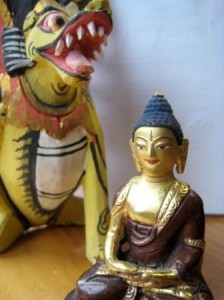Thursday
Dharma TeachingsSeeing Depression
 In this article, Acharya Michael Greenleaf dives fearlessly into the solidity of depression and offers insight into causes, describes what is happening in our minds, and shows how meditation practice can lead to the strength and composure of true tenderness
In this article, Acharya Michael Greenleaf dives fearlessly into the solidity of depression and offers insight into causes, describes what is happening in our minds, and shows how meditation practice can lead to the strength and composure of true tenderness
Alone
It’s hard to count on anything. These days even the earth may move under our feet. The weather is unpredictable. Finding true friends is hard. If we stop to notice, everything is changing, which leaves us vulnerable.
We too experience ups and downs. They are hard to pinpoint. What do we really feel? If we wanted to say how we really feel, could we? When we try, the effort seems to fall short. While our experience touches us, it can’t be fully shared. We are alone in that way, which is sad.
A Lonely Feeling
Trungpa Rinpoche calls this experience of aloneness the “genuine heart of sadness.” Aloneness isn’t alienation. It’s a clue. We spend all this time trying to manage life, trying to secure ourselves, trying to maximize. But who are we really? Have we ever really looked?
On the path of meditation, this sad feeling isn’t a fault. We may look for ways to shield ourselves from our vulnerability, but treatments with drugs or therapy wouldn’t help and wouldn’t be the point. In fact, according to Suzuki Roshi, for the practitioner of meditation, the sad and lonely feeling “grows and grows,” until it becomes enlightenment.
Editor’s Note: We are currently on hiatus from publishing new articles; in the meantime, please enjoy this classic item reprinted from our back issues.
A Bad Feeling
Growing up, we had a picture of what life was. Over time, our picture changed. Things should be different. The way they’re supposed to be. We try to find the source of our discontent. Confronted with the uncertainty of experience and our own vulnerability, we feel cheated. How could life leave us so exposed? Our expectations for life aren’t met. We feel bad.
Having rejected our experience as it is, we are stuck with our own unhappiness, a vague sense that nothing is satisfying or meaningful—a kind of numbness. “What’s the point?” is our question for everything. In whatever we do, we “go through the motions.” While it’s not articulated, there is an underlying sense of complaint.
Buried Resentments
Other times our unhappiness is more vocal and more paralyzing. Someone or something is to blame. Blaming leaves us helpless, since the source of our unhappiness is beyond our control. In this culture of self-help, everyone knows blaming others only debilitates and disempoweres.
This common insight traps us. While we really do resent others, we are proud. Articulating our hurt and anger would expose our vulnerability and the brittle logic of our pain. We prefer to keep this humiliation private.
Not wanting to expose our tenderness, we resolve to shoulder the burden of life’s injustices. In the name of our “reality”, we martyr ourselves. Over time, this buried resentment manifests as a lack of sensitivity to life’s messages. While our resentment is directed toward others, the limits we have set on life are self-imposed.
Going on Trial
Since blaming others leaves us exposed and helpless, we resolve to blame ourselves. Conveniently and privately, we just put ourselves on trial. In this case, we are our own judge, jury and executioner. Objecting to the treatment received at our own hands, “Objection Overruled!” is the reply.
Self-loathing is a Kafkaesque show trial. There are witnesses for the prosecution, but their lack of credibility is never challenged. Testimony from others is imagined. While it seems to come from outside, it has been scripted by us. Strangely, the imagined judgments of others neatly parallel our own.
Being on trial, any move we make is criticized by agents of the prosecution (us). If we struggle or try and talk our way out, it is a sign of our culpability. If we don’t, it is the behavior of a condemned person.
The Real Crime: Theft
We may have behavior we regret, and hurt suffered at the hands of others. Rather than the action itself, our thoughts seek to isolate, condemn and imprison someone who, at close inspection, cannot be found: the actor we have put on trial.
Self-loathing and resentment are powerful because our voice has been stolen. Our capacity for reasoning has been hijacked by circular thoughts pretending to confront something they cannot – themselves. (After all, only one thought can fit in the “courtroom” at time.)
Thoughts of self-denigration and resentment are like children dressing up in adult’s clothing, claiming to know something, pretending to pursue the truth. There is a natural order to our intelligence, where gentleness, self-respect and reason can govern. In resentment, this order has been subverted.
Other as Jailor
Like any trial, the basis for the judgment is others – what they did, think, saw and see. In place of a real relationship with others is an imagined one, in which the motives, judgments and feelings of others are imputed. Even if we allege to condemn ourselves all on our own, there is a reference point from somewhere, an ideal against which we have fallen short.
Being lost, we imagine only one way to be found: in relation to something or someone else. We have traded our sad and lonely feeling, which is spacious and tender, for the safety of a prison built on reference points from elsewhere. At least we know where we are. To stay locked up, we make sure that someone or something else holds the key.
Finding our Voice
Silenced by our depression and resentment, we need help recovering our voice. Without a voice, our reason, our intelligence, life beyond our circular thought process, is blocked. Like a king or queen surrounded by bad advisors, we lose faith in our world and ourselves.
Sources of good advice will vary. Looking for it is evidence of intelligence, our true voice, beginning to make itself heard. Depression and its habits thrive on the illusion of privacy. Seeking advice, we are ready to articulate the truth of our situation. This effort toward honesty beyond defensiveness is just as essential as the advice we receive.
The Role of Meditation
Sitting meditation, returning our attention again and again to the sensation of breathing, helps us recover our reason and overcome depression. In the practice of mindfulness meditation our posture is upright, even regal. The dignity and openness of our posture is a powerful message we send to ourselves. It gives us courage.
Placing our attention on the feeling of breathing slows down and even interrupts the circular rumination upon which simple depression and resentments are built. Mind’s natural stability is allowed to surface. Stability of mind calms fear, allowing for relaxation. It is the ground of meditative awareness – our inherent intelligence.
Faulty Logic
Native intelligence isn’t driven by fear. It doesn’t panic in face of uncertainty or suffering. When depression or resentment speaks, inquisitive clarity borne out of meditation simply raises an eyebrow and says “How’s that?” With awareness we can meet depression’s negative assertion with patient inquiry. We are willing to look directly at depression and its story. Eventually, cracks emerge in the logic of our suffering. Finally, depression and unhappiness play a desperate card: “This pain itself is justification for it’s own unhappiness. It shows that something, somewhere, is basically wrong.”
Your Bad/You’re Good
Our struggle includes insight, but if we didn’t care for others or ourselves would we bother condemning either? If we all weren’t connected in some profound way, how could we experience hurt? Self-loathing and resentments burn us, but that fire contains warmth, it shows we care. Denying oneself is painful. It is also an expression of our native intelligence – every attempt at reasonableness that arises from within or without is met and countered.
Depression evidences mental focus. We maintain our unhappiness regardless of the time or place, even while we sleep! Mind’s natural ability to meditate, to stay with an object of mind, shines forth. It is this same power of mind that the meditator harnesses in the practice of mindfulness meditation.
Being Willful
Being quietly with oneself on the meditation cushion in the practice of mindfulness reveals just how we hassle ourselves – all the time. We won’t let our body rest, and we refuse to let experience be as it is. Dwelling on a future (that never arrives) or a past (now gone) we lose the only moment we have, this one.
The instinct toward resentment arises out of fear. While it presents itself as natural and effortless, in meditation self-loathing is revealed as a willful attempt to protect us from seeing and knowing life. In the name of “hard reality,” we turn away from the only truth we have — our own experience, moment by moment.
True Protection
Rejecting experience beyond expectations, we lose our life and our voice, and fail to notice a meaningful and colorful world perfectly willing to engage. We also neglect the chance to develop a mind with its own inherent strength and composure.
The practice of meditation trains us in how to be. Rather than protecting us from being touched, it arouses an inherent intelligence that protects our sad and tender heart from circular thoughts seeking a security that never was. It is a brave and kind thing to do. Because mindfulness meditation allows us to directly face and learn from our experience, it is the only true protection.
Acharya Michael Greenleaf lives in West Barnet, Vermont. He is a faculty member of the Mukpo Institute at Karme Choling, a rural meditation center in the Shambhala Buddhist tradition, and a volunteer blogger at Samadhi Cushion’s Blog









May 6, 2010
Reply
I appreciatee the beautiful progression in view and technique to help dispel the depressive states we create in our minds. Worth mentioning, thouhg, is that clinical depression, otherwise known as Major Depressive Disorder, is a true medical disorder in which up to 12 biochemical pathways in the brain are affected, according to ongoing research at NIH. Those experiencing clinical depression should know that medical treatment is an essential part of the path. Just as one would not expect successful meditation while sitting with broken limbs, one should not expect to have success with a comparable level of mental agony. Research now shows us the significant changes in many areas of brain function in persons with clinical depression. Medical treatment can help restore a person to a level where they can have the ability to begin working with their mind and not give up because of the depth of agony that is experienced. Walking a path becomes feasible when one’s legs are no longer broken.
May 6, 2010
Reply
Depression never sounded so lovely yet the experience described captures the poignancy perfectly. It is a space to grow in/from.
Apr 1, 2010
Reply
Yeah, thanks Michael — I think…
Apr 1, 2010
Reply
Profound and brilliant insights in the world of depression showing how the union of shamatha-vispashyana practice can transform and heal.
Mar 29, 2010
Reply
Nice blending of basic goodness and insights from Western therapies – this vivid description reminds me of some of Ted Rubin’s writing. Interestingly, his teacher, Karen Horney, a student of Freud who challenged Freudian thinking from a feminist perspective, became Buddhist.
Mar 27, 2010
Reply
Thank you for this article. Many new insights for me that I can see will be of great benefit. I just began practicing and studying in earnest last September and I have just recently realized there is indeed a marked difference in my depressions.
Looking forward to deepening and strengthening my practice and my studies.
Mar 26, 2010
Reply
Very articulate and funny! Acharya Greenleaf is an amazing writer, although he lost me at times.